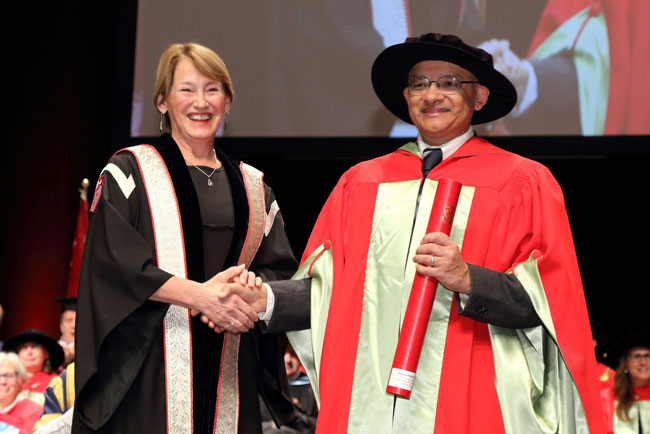
By Neale McDevitt
Four of the University’s top teachers were awarded a Principal’s Prize for Excellence in Teaching at the recent Fall Convocation ceremonies. Established in 2000, The Principal’s Prize is presented to one recipient in each of four categories: Faculty Lecturer, Assistant Professor, Associate Professor and Full Professor. The McGill Reporter spoke to this year’s recipients and asked them about their early teaching gigs, their mentors and what conditions they must create in the classroom to get the most from their students.
Caroline Begg: Creating connections
Caroline Begg reflects on her days as a student with a rueful chuckle. “In the classes I teach now I always keep an eye on the people sitting in the back row because I know that the students in the front are paying attention,” says Begg, winner of the Principal’s Prize in the Faculty Lecturer category. “I was the one sitting at the back and watching the clock not move. I wasn’t the most receptive student.”
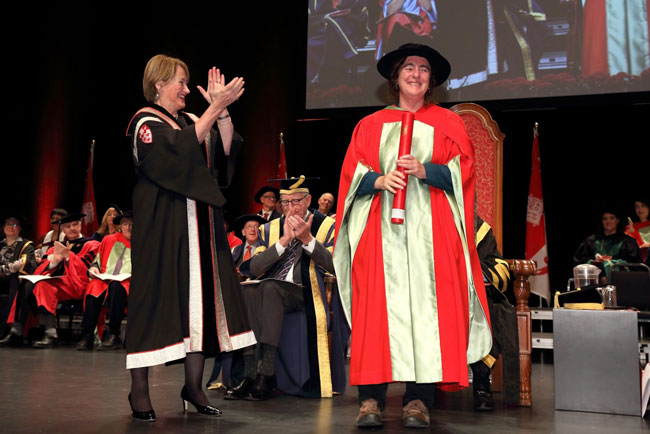
And the self-effacing Begg admits that her early foray into teaching, which she says she “kind of fell into,” wasn’t a rousing success. “Sometimes people come up to me and say they took a course with me 10 years ago and I apologize,” she says with a laugh. “I was really bad then.”
Begg says on top of her nervousness (“People say they could see my hand shaking”) she was more concerned with delivering a lecture than engaging students. “I really thought that the amount of material I presented was more important than whether or not students actually understood it.”
But over time, and with the support of Teaching and Learning Services, Begg has developed a personal style that suits her, her students and her subject matter. Because her areas of expertise – ecological agriculture and ecosystem management – involve large, interconnected systems, she has adopted a teaching style that links seemingly diverse subjects. “I don’t teach one section and move on,” she says. “I try to tell a story so that people see and understand the connections,” says Begg.
Connections and continuity are threads that run through much of Begg’s life.
“Part of my family is from Quebec and in farming so it was a natural progression to continue into something to do with soil or crops,” she says.
The same holds true in her classrooms where she loves nothing more than matching students from different faculties and backgrounds to reflect upon the bigger picture. “One of the courses I teach is ecological agriculture. Students have ranged from bioresource engineering, nutrition and art to geography and agriculture,” she says. “I want people to ask how these different perspectives fit together. How are they linked?
“I may learn something about nutrition that is new to me but I can see how this will fit into food production or how it will influence consumer desire,” says Begg. “I want students to understand that we are all part of one very large system.”
For Begg, teaching’s biggest payoff is watching a student develop their own narrative. She talks about a former student, Sarah Archibald, who won the Macdonald Distinguished Young Alumni Award in 2016. “Sarah has been working with the Meal Exchange in Toronto and she has been helping universities across Canada become more sustainable in their sourcing of food,” says Begg. “It’s amazing to see someone leave here and have a positive impact. Most of my top students are going to be change-makers in the world.”
Hoi Kong: Keeping the conversation going
Hoi Kong was hooked on working with students from the very first time he walked into a class as a teacher. “I remember teaching my first class as an Associate-in-Law at Columbia Law School,” says Kong, member of the Faculty of Law and winner of the Principal’s Prize in the Associate Professor category. “It was exhilarating and I get some version of that feeling whenever I get in front of a classroom now.”
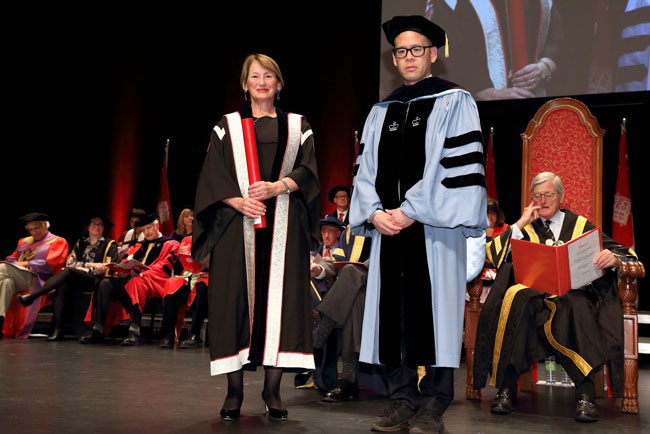
Kong’s enthusiasm for teaching is equaled only by his zeal for the subject he teaches. “I think the law is a profoundly human endeavour, and so it is almost inexhaustibly interesting,” he says, crediting his stint in 2002-2003 as a law clerk for Justices Marie Deschamps and Claire L’Heureux‐Dubé at the Supreme Court of Canada with helping stoke the fires.
The experience, he says, “allowed me to observe up close two people who are leading deeply passionate and committed lives in the law.”
As a teacher, Kong hopes that the lessons learned in his classroom are just starting points. “When things have really worked in a classroom, I hear from students how they continue the classroom conversations with each other after class, over lunch and off campus,” he says. “I also hear from alumni about how things they learned shape what they are doing in their day-to-day lives.”
Kong thinks that there is a special quality to McGill students. He remembers how a colleague from another university told him about walking through McGill’s campus and being struck by hearing students talking about what they were learning. “That level of student engagement is really a precious gift for a teacher,” he says.
The importance of the quest for ongoing conversations – even if they are internal ones – is something Kong learned, in part, from the late Roderick Macdonald, an iconic McGill Law professor. “I learned from Rod how important it is to be sincerely committed to being a good teacher,” says Kong. “For Rod, this involved honestly assessing oneself and continuously learning about teaching.
“’Underlying this process of constant reflection was a recognition that teaching is a lifelong path, that one can always do better, and that one has a continuing responsibility to develop one’s judgment about what makes for good teaching,” says Kong.
Good teaching, in Kong’s view, comes with making “a real connection” with students in ways that are not always directly related to the classroom endeavor. “There is something genuinely lovely about being able to laugh together,” says Kong. “There is a kind of grace that comes with being able to see the absurdity and folly in things.”
Alanna Watt: The evolution of an educator
When asked about her first teaching experience, Alanna Watt chuckles. “I think I’ve blocked out those memories,” she laughs. “Those first few lectures [as a graduate student at Brandeis University] were pretty intense for me. I was incredibly nervous.”
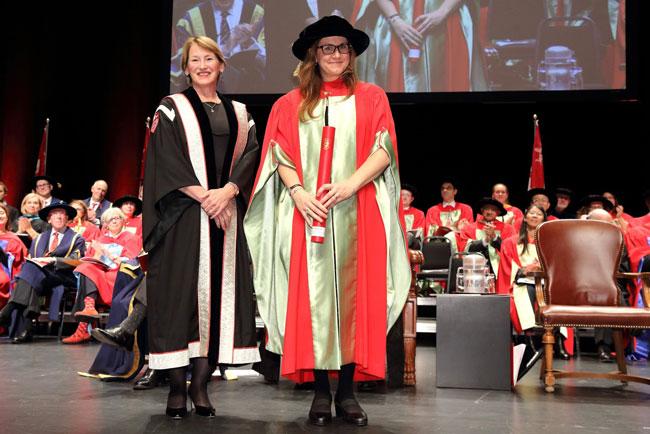
But, Watt, from the Department of Biology and winner of the Principal’s Prize in the Assistant Professor category, overcame those early jitters. “I had the opportunity to design and teach a course [at Brandeis], which was a fantastic experience,” she says. “That made me realize that teaching was something I wanted to be a part of my career.”
Watt understands the impact early university experiences can have on a student. She credits introductory biology courses she took as an undergraduate with piquing her curiosity about the brain and steering her toward a career in neuroscience. “I think that the brain is fascinating to study because there are so many big questions – How is information encoded? How does this incredible structure develop? What happens when things go awry in disease? – that we are in many cases still in the infancy of understanding,” she says.
While she admits she often feels squeezed for time between her classroom and lab commitments, Watt wouldn’t want it any other way. “I would not want to be a researcher without teaching,” she says. “Teaching has a lot of positive impact on my research, and vice versa.”
Watt believes her classroom works best as a dialogue, with students participating freely in the discussion. “To achieve this, I have to work hard to ensure that different students with different backgrounds feel comfortable to express themselves, so that there is a diverse range of opinion and insight into the class discussion,” says Watt. “I feel happiest when this happens. It can be a magical experience.
“The students I teach are passionate and smart, and really want to be in the class, really want to learn. It’s a joy to have such able and committed students,” Watt continues. “Watching students grow intellectually and as scientists is a probably the most rewarding part of my job. Getting to play some small role in that process is deeply humbling.”
Not surprisingly for a biologist, Watt discusses her style of teaching – and the path that she has taken to get here from those early, nervous days in Brandeis – as an evolution. “I’ve been lucky enough to have several professors who have left a lasting impression on me. I have fabulous colleagues in the Biology Department and the wider McGill community who are passionate educators, with whom I discuss teaching,” says Watt. “These colleagues have given me a lot of good advice that has helped me develop as a teacher. I don’t think I model my teaching on any one mentor – rather, I draw inspiration from many mentors, and have used those positive examples to find my own way to teach.”
Prakash Panangaden: McGill students “as good as the best students anywhere”
The year was 1980, and Prakash Panangaden had just completed his PhD at the University of Wisconsin. If you had approached him then and told him one day he would win the Principal’s Prize for Teaching (in the Full Professor category) as a member of the Computer Science Department, he may very well have laughed out loud.
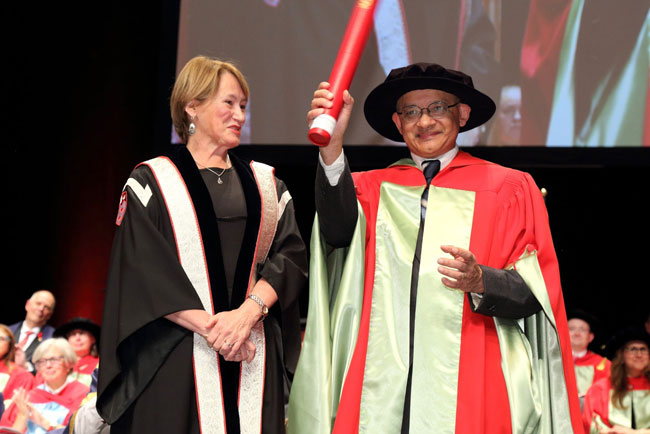
For starters, Panangaden’s PhD was in Physics. “I came to computer science late in life. I was a post-doc in the field of physics when I came across a book on the lambda-calculus,” he says. “I realized that computer science was a beautiful subject with deep mathematical ideas and connections with profound philosophical questions like: What can be computed? What is reasoning? Can a computer program understand itself? What is understanding?”
He also hadn’t planned on becoming a teacher. “I didn’t have any idea that I would like or be good at teaching when I was at university. It was only in graduate school when I was required to run recitation sections that I realized that I liked teaching,” says Panangaden. “My main drive was always to be an active researcher but now I see teaching as inextricably woven in with this.
“University teaching must be connected to research and research cannot be sterile; it has to relate to what people care about,” Panangaden continues. “My research helps my teaching because I can tell students, even in the lowest-level classes, about things that are happening at the forefront of research. Crucially, they get to see the subject as living and not fossilized in a book.”
Panangaden says he received some of the best advice on teaching from a professor at the University of Chicago. “This professor gave me low-level practical advice – how to organize your thoughts and ideas and present them in a clear order; what to emphasize; how to use examples; even advice about tone and voice,” says Panangaden. “General purpose ‘advice’ that I often receive about ‘teaching philosophy’ I find useless.”
In the classroom, Panangaden still follows that advice, trying to create an ambience that is both challenging and welcoming for students.
“Lecturing is not about making speeches to the students. They have to interact with me; even in a big class,” he says. “I have to make sure that students feel secure and they understand that intervening is welcome. They must not feel that they are asking a ‘stupid question.’ I tell them that the stupid questions are the ones they don’t ask.”
One of the biggest rewards Panangaden gets from teaching is establishing what he calls “good old-fashioned human relationships” with his students while watching them “think for themselves and do things beyond what I teach them… I have taught at several places around the world including in the Ivy League. The best McGill students are as good as the best students anywhere.”
